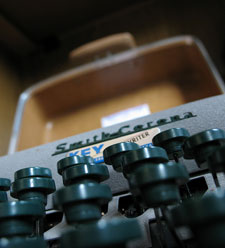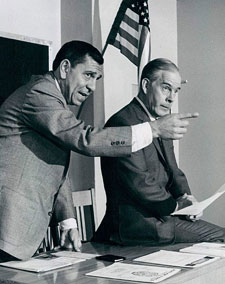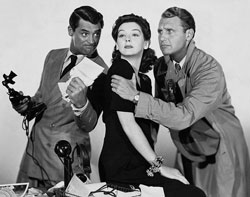Theme Essay by Jeremiah Horrigan
Wrestling with My Inner Jack Webb
I always wanted to be a writer like my dad. A newpaperman, Dad was mad about sports even as a kid. After he got out of the Navy in 1945, sportswriting was all he ever wanted to do.
I hated playing sports. But I loved reading the newspaper Dad wrote for in the late ‘50s: The Buffalo Evening News. I knew I’d never be a sports reporter. Yet, I also knew there were other sections of the paper where I might someday see my name in print, followed by reports that I would write and phone in to the office from the field.
 For my dad, the field was sometimes the kitchen table. He’d perch himself in front of his gunmetal-gray Smith Corona portable, putting away his White Owl cigar just long enough to down glass after glass of ice-heavy Pepsi Cola. He’d scroll a sheet of carbon-papered foolscap into the roller and lean over the typewriter as if walking into a Buffalo headwind. Then, using no more than four fingers, he’d attack the keyboard with the coiled-up grace of a pianist spinning arpeggios out of a concert grand.
For my dad, the field was sometimes the kitchen table. He’d perch himself in front of his gunmetal-gray Smith Corona portable, putting away his White Owl cigar just long enough to down glass after glass of ice-heavy Pepsi Cola. He’d scroll a sheet of carbon-papered foolscap into the roller and lean over the typewriter as if walking into a Buffalo headwind. Then, using no more than four fingers, he’d attack the keyboard with the coiled-up grace of a pianist spinning arpeggios out of a concert grand.
Thus began my romance with newspapering.
I conjured that memory when, newly delivered into fatherhood in the early ‘70s, I went looking for a job in the town where I grew up. I wanted to write, and I needed to make a living. Newspapering seemed the perfect solution.
I got my first writing gig working nights at the Buffalo Zoo, where I composed short, terrible sci-fi stories instead of pushing a chemical broom down the dank and chattering hallways of the Monkey House.
Within a year, I got a tryout at the Niagara Falls Gazette, a small-circulation daily downriver from the mighty Evening News.
The Gazette was where I discovered that newspaper reporters don’t just write stories. They submit them to copy editors, who submit them to city or section editors, where strange things happen to them—both to the stories and to the reporters.
Back then, those editors were my good shepherds, because there’s no one more in need of shepherding than a cub reporter—especially one whose only experience was writing stories about alien beings who looked and acted a whole lot like mad baboons.
Those early editors kept me on track and out of jail. They challenged my assumptions, corrected my grammar, dug up my buried leads, damned me with faint praise, scared hell out of me, and made impossible demands, some of which I took pride in occasionally achieving.
They pushed me. They shoved me up against deadline walls. They chopped and channeled and squeezed and cut my copy, and they didn’t apologize for their butcheries. They growled at the 50-word leads I labored to concoct. They demanded facts. Numbers spoke as loudly to them as words. Cops spoke even more loudly. They hated big words, numbers that didn’t add up, and any color that wasn’t black-and-white. They said they edited for a guy they called Joe Six-Pack, and they expected reporters to address themselves to that same guy, if only to make their jobs a little bit easier.
If that sounds like a complaint, it’s not. I was a newly enrolled student in the Jack Webb School of Just-the-Facts-Ma’am Journalism that dominated provincial newspapering through the ‘70s and ‘80s. I studied hard at doing Jack. Got good at it. I had to, unless I wanted to go back to pushing a broom.
 However, when it came to writing stories outside my beat—school board meetings, city councils, car accidents—and in any depth deeper than a pica, Jack was more problem than solution. He'd not only dug himself under my skin, he’d gotten into my head.
However, when it came to writing stories outside my beat—school board meetings, city councils, car accidents—and in any depth deeper than a pica, Jack was more problem than solution. He'd not only dug himself under my skin, he’d gotten into my head.
I could watch, record, enumerate, report, stay within the inch-count, and never blow a deadline. Jack always approved. But I wasn’t writing anything memorable. I was informing people, not enlightening them. I felt like I’d lost something.
The sunny, tobacco-fragrant kitchen of my youth had become an airless bunker. Every morning, I rose in a state of dread to confront a dully buzzing IBM Selectric, a ream of blank paper, and a coffee cup full of dead cigarette butts.
After I’d moved on to another paper, with Jack even more forcefully in control, I came to believe I’d only be rid of him by trying something I’d never done before.
In the early ‘80s, I got my chance: I landed a freelance assignment from a big-deal Sunday magazine to report on a weekend of fun and games in the Catskills aimed at Jewish singles. I was neither Jewish nor single. It was to be a “fish out of water story,” with me as the fish.
I was so far out of water I was gasping for air. Standing in the decrepit vestibule of the once-grand resort, I felt immediately out of my depth. I expected glitz; what I found was bygone glory. When I tried to buttonhole the few people who were there—standing still at the edge of the near-empty dance floor or seated at the moldy bar—they recoiled. They made it clear they hadn’t paid good money to spend the weekend talking to a nosy reporter about their mating habits or lack thereof.
My training in the Five Ws had prepared me for a lot, but not for this: a melancholy parade of desperate people, trapped overnight in a broken-down, memory-haunted, Borscht Belt palace.
I came home with a riot of images in my head. I hardly knew where to start. When I sat down at the typewriter, Jack collared me and threw me back in the bunker, where he read me the riot act:
No lead, no conflict, no story, kid. And they want 2,000 words by Friday.
Jack knew me well; he knew all my soft spots and he hit them every chance he got. He sweated me day and night, and he loved it. I wrote lead after lead. No single story dominated. There were no happy endings. No happy beginnings. I was out to sea, drowning in my notes and paranoia. And there was Jack, standing on shore, grinning.
“Told you so, kid. You’re going down, just like I said you would. Hey! You’re not even Jewish. And what’s today? Wednesday already?”
Feeling as desperate and alone as the folks I’d spent the weekend trying to schmooz, I started writing snippets. Anecdotes. Descriptions. At the typewriter, and on scraps of paper. I wrote schtick. Dialect. A hundred-word interview. A longer one. I worked the historical angle. Then I reached for the scissors, paste, and White-Out. I slapped revisions on top of revisions. The thick, crinkly manuscript I finally mailed away looked like I’d dipped it in water and let it dry in the sun. Its ten pages must have been two inches thick.
It made the magazine’s cover. And I didn’t blow the deadline.
Since those early days, I’ve written thousands of news stories, feature stories, opinion pieces, movie reviews, and humor columns. I’ve written fiction and nonfiction books, magazine pieces and lengthy profiles. There’s an ancient screenplay sitting in my sock drawer, and a children’s play that’s actually been produced.
But Jack is still with me, making his presence known from time to time. He’s the one responsible for this being the fourth draft of a story I thought I had down in draft one, the just-the-facts voice who kept me floating happily on the story’s surface—until my editors at TW pushed me to go deeper, as literary editors do.
 Romance dies hard with me. And, odd as it may seem, my inner Jack Webb is part of my life’s romantic dream: the dream of being a writer like my dad—and like the many newspaper wordsmiths I’ve worshipped throughout my life. I will always revere Woodward and Bernstein, Ernest Hemingway (who started as a reporter for the Kansas City Star), and Walter Burns, the fast-talking, hard-boiled newspaper editor played by Cary Grant in the movie His Girl Friday.
Romance dies hard with me. And, odd as it may seem, my inner Jack Webb is part of my life’s romantic dream: the dream of being a writer like my dad—and like the many newspaper wordsmiths I’ve worshipped throughout my life. I will always revere Woodward and Bernstein, Ernest Hemingway (who started as a reporter for the Kansas City Star), and Walter Burns, the fast-talking, hard-boiled newspaper editor played by Cary Grant in the movie His Girl Friday.
But when I feel the call of that romantic stereotype getting in my way—causing me to wrestle once again with my inner Jack—I have to remind myself that I’ve fulfilled the important part of that early dream. I’m a writer.
Not, as I once wished, a writer just like my dad. Instead, I’m a writer just like myself.
-30-
Excerpt: “Welcome to the Singles Weekend at Grossinger’s"
Three smartly dressed women approach the large round table from across the vast dining room, where a middle-aged man in a double-knit blazer sits attacking a chicken dinner. The man ignores the women. He’s waiting for his cue. One of the women provides it when she politely asks, 'May we join you?'
Julius Broatman pounces.
'You wanna join me? Do I look like I’m falling apart?' "The ensuing silence is painful. Julius’s Henny Youngman number isn’t working. The women are in shock. Julius relents, grandly waving the flustered women to empty chairs.
'Sit, sit, go ahead. Please. There’s three of you and one of me. What am I gonna do, argue?'
The women sit, murder stirring in their eyes. Such are the perils of making contact at a singles weekend in the Catskills, where expectations are made to be broken.
—Jeremiah Horrigan, Northeast Magazine, July 8, 1984
Art Information
- “Smith Corona Sterling, c. 1958″ © Michael Clemens; Creative Commons license
- Jack Webb and Harry Morgan in Dragnet; publicity image; public domain
- His Girl Friday; publicity image; public domain
Jeremiah Horrigan is a contributing writer at Talking Writing.
One of his favorite descriptions of the newspaper trade is from A. J. Liebling’s book The Press:
"The pattern of a newspaperman’s life is like the plot of Black Beauty. Sometimes he finds a kind master who gives him a dry stall and an occasional bran mash in the form of a Christmas bonus, sometimes he falls into the hands of a mean owner who drives him in spite of spavins and expects him to live on potato peelings.”
Jeremiah notes that his newspapering stall has mostly been warm and dry—though it’s been a while since he’s seen a Christmas bonus, in any form.

